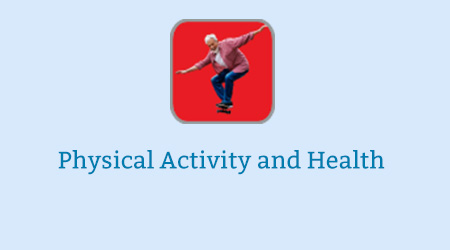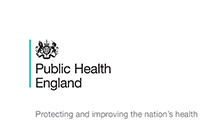About the Physical Activity and Health programme
“If physical activity were a drug, we would refer to it as a miracle cure, due to the great many illnesses it can prevent and help treat.” UK Chief Medical Officers, 2019*
Whatever our age or health status, there is compelling evidence* that being physically active can help us lead happier, healthier lives.
Several high-level systematic reviews have identified risk reductions of 25-50% or more in major chronic diseases for individuals who achieve the physical activity levels set by the UK Chief Medical Officers’ guidelines**. More than that, physical activity can be one of the most important tools in the healthcare professional’s toolkit for condition management. It can lead to improved clinical outcomes in over 30 different chronic diseases, including type 2 diabetes, and be as effective as medication in many instances: hypertension, stroke, and mild-to-moderate depression, to name just a few.
This elearning course prepares GPs, nurses and other healthcare professionals to champion the benefits of physical activity with their patients and, in doing so, help prevent and/or manage a range of common physical and mental health conditions. The course will familiarise the learner with the UK Chief Medical Officers’ physical activity guidelines, the underpinning evidence base and how to incorporate it into their daily clinical care.
More information
Among the course resources are a ‘how to’ video on Motivational Interviewing with Dr William Bird MBE. There is also a guide to Promoting Physical Activity in Primary Care. William Bird is a GP in Reading, a specialist in physical activity and a long-time advocate of walking for health.
Satellite sessions explore people’s changing needs across the life course and the crucial impact of physical activity on children, young people and older adults. A session on pregnancy and the postpartum period provides information to support healthcare professionals empower pregnant women and new mothers to make informed choices about physical activity throughout motherhood.
This course also gives a comprehensive guide to physical activity in the clinical management of the following long-term conditions: cancer, cardiovascular conditions, diabetes, musculoskeletal health and mental health. Mindful that people are often short of time, both a short-form (5 mins) and long-form (up to 30 mins) version is available.
To generate a certificate of completion, complete the course introduction and the assessment session. Each session lasts approximately 20-25 mins. We encourage you to explore what’s available; there may be more than one session that is relevant to your work. Take the whole course if this area is new to you and introduce a new dimension to your patient care.
Help your patients stay active, to improve their health and treatment outcomes.
* Department of Health. UK Chief Medical Officers’ Physical Activity Guidelines. 2019; London: Department of Health and Social Care.
** Pedersen BK, Saltin B. Exercise as medicine – evidence for prescribing exercise as therapy in 26 different chronic diseases. Scand J Med Sci Sports 2015;25:1-72.
** Stevens Z, Barlow C, Kendrick D et al. Effectiveness of general practice-based physical activity promotion for older adults: systematic review. Prim Health Care Res Dev 2014;15:190-201.
Acknowledgements
The team would like to thank Suzanne Gardner of Sport England, Dr Andrew Boyd, Dr Campbell Murdoch, Jan Sinclair and internal teams at Public Health England and NHS England for their work guiding and reviewing this project. Thanks are also due to Dr Anh Tran, Dr Stewart Tomlinson, Dr Jackson Brown, and Jo Foster-Stead for their generous support and advice.
We would like to acknowledge the assistance of: Professor Oliver Howes, Maudsley Hospital; Professor Robert Thomas, Addenbrooke’s Hospital; Sally Goddard Blythe, Institute for Neuro-Physiological Psychology; Dr Jane Thornton, Canadian Academy of Sport and Exercise Medicine; Dr Sandra Agyapong-Badu, School of Sport Exercise and Rehabilitation Sciences, University of Birmingham; Professor Karen Walker-Bone, Centre for Musculoskeletal Health and Work, University of Southampton; Dr John Cairney, Infant and Child Health Research Lab (INCH), University of Toronto; and Dr Charlie Foster, Centre for Exercise, Nutrition and Health Sciences, University of Bristol. Thanks too are due to Dr Justin Varney, Director of Public Health at Birmingham City Council.
Meet the team

Dr William Bird MBE
General Practitioner, NHS Berkshire West
Gaynor Aaltonen
Senior Scientific Writer, Public Health England
Dr Mike Brannan
National Lead for Physical Activity, Public Health England
Professor Anthony Woolf
Director, Bone and Joint Research Group, Royal Cornwall Hospital, Truro
Tracy Watkins
Lead Learning Designer, HEE elearning for healthcare
Wendy Lowe
Learning Designer, HEE elearning for healthcare
Karen Walker
Learning Designer, HEE elearning for healthcare
Claire Beattie
Learning Designer, HEE elearning for healthcare
Alan Campbell
Animation Designer, HEE elearning for healthcare
How to access
In order to access the Physical Activity programme, you will need an elfh account. If you do not have one, then you can register by selecting the Register button below.
To view the Physical Activity programme, select the View button below. If you already have an account with elfh, you will also be able to login and enrol on the programme from the View button.
NHS healthcare staff in England
The Physical Activity programme is also available to NHS healthcare staff via the Electronic Staff Record (ESR). Accessing this elearning via ESR means that your completions will transfer with you throughout your NHS career.
Further details are available here.
Not an NHS organisation?
If you are not an NHS health or care organisation and therefore do not qualify for free access elfh Hub, you may be able to access the service by creating an OpenAthens account.
To check whether or not you qualify for free access via OpenAthens, you can view the eligibility criteria and register on the ‘OpenAthens’ portal.
Registering large numbers of users
If you are a HR, IT or Practice Manager and would like to register and enrol large numbers of staff within your organisation for access onto the Physical Activity programme, please contact elfh directly.
Organisations wishing to use their own LMS
For HR departments wanting to know more about gaining access to courses using an existing Learning Management System please contact elfh directly to express interest.
More information
Please select the following link for more information on how to use the elfh Hub.






